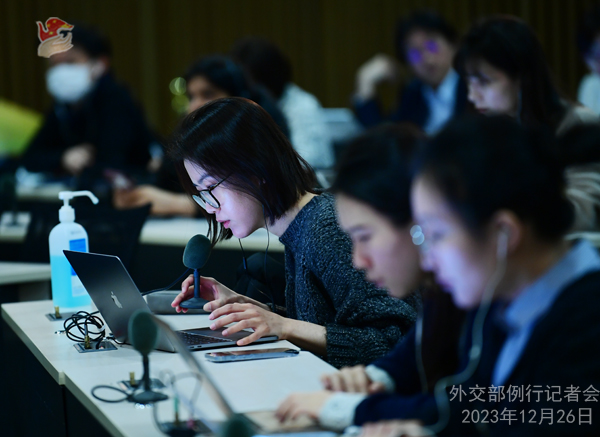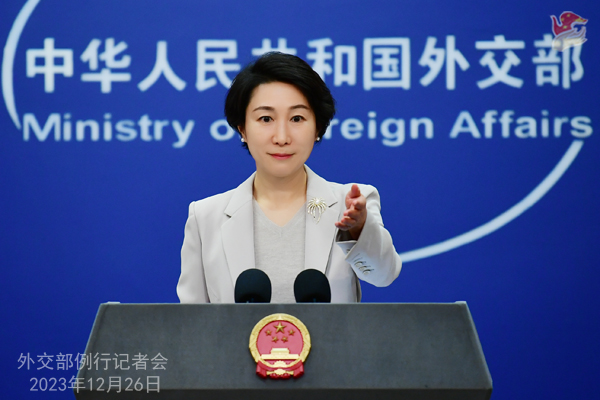| Foreign Ministry Spokesperson Mao Ning’s Regular Press Conference on December 26, 2023 |
| 2023-12-26 20:33 |
|
China News Service: Premier Li Qiang attended the fourth Lancang-Mekong Cooperation (LMC) Leaders’ Meeting on December 25. Do you have more information to share about the meeting and the outcomes of the meeting? Mao Ning: Yesterday, the fourth Lancang-Mekong Cooperation (LMC) Leaders’ Meeting was held via video link. The meeting was a success. Premier Li Qiang and the leaders of the five Mekong countries attended the meeting. Focusing on the theme “Join Hands on the Building of a Community of Shared Future and Modernization among Lancang-Mekong Countries”, the leaders took stock of the progress of Lancang-Mekong cooperation and jointly planned for the future of the LMC. Premier Li pointed out that over the past seven years since the launch of the Lancang-Mekong cooperation mechanism, under the strategic guidance of President Xi Jinping and the leaders of the Mekong countries, the six countries have built a powerful engine to promote development, a solid backing for common security, and a strong bond of mutual understanding. In particular, China announced with Cambodia, Laos, Myanmar, Thailand, and Viet Nam respectively the bilateral decision to build a community with a shared future, which will further boost efforts to build a Lancang-Mekong community with a shared future and provides a great example for building a community with a shared future for mankind. China put forward a four-point proposal on the future of the LMC. First, deepen integrated development and stick to openness and cooperation. China will launch a special loan for LMC common development to support the key projects in each country. Second, promote green cooperation. The six countries need to fully respect each other’s legitimate right to develop and utilize water resources rationally and advance cooperation in energy transition and ecological conservation. Third, strengthen security governance, advance the Operation of “The Safety of the Lancang-Mekong Region” and effectively crack down on telecom fraud and online gambling. Fourth, deepen people-to-people and cultural exchanges and cultivate new bright spots such as think tanks and subnational cooperation. Parties spoke highly of the fruitful results from Lancang-Mekong cooperation, and stressed that the six countries will share opportunities, jointly respond to challenges, plan future LMC together, further deepen and substantiate it and develop the Lancang-Mekong Cooperation Economic Development Belt and a Lancang-Mekong community with a shared future. The meeting adopted the Nay Pyi Taw Declaration of the Fourth Lancang-Mekong Cooperation Leaders’ Meeting, Five-Year Plan of Action on Lancang-Mekong Cooperation (2023-2027), and Joint Initiatives on the Lancang-Mekong Cooperation Innovation Corridor Development. China Review News: On December 22 local time, US President Joe Biden signed into law the National Defense Authorization Act for Fiscal Year 2024, which contains negative China-related content. What’s China’s comment? Mao Ning: Despite China’s opposition, the US passed and signed into law the National Defense Authorization Act for Fiscal Year 2024 that contains negative China-related content. China strongly deplores and firmly opposes this and has made serious démarches to the US side. The Act interferes in China’s internal affairs, preaches US military support to Taiwan, and violates the one-China principle and the three China-US joint communiqués. We urge the US to honor the commitment of its leader of not supporting “Taiwan independence”, stop manipulating the Taiwan question and stop endangering peace and stability in the Taiwan Strait. The Act pictures China as a threat, suppresses Chinese companies and limits normal economic, trade and people-to-people exchanges between China and the US, which serves no one’s interest. The US needs to abandon the Cold War mentality and ideological prejudice and create a favorable environment for China-US cooperation in trade and other sectors. We urge the US to work with China to deliver on the important outcome and common understandings of the San Francisco summit. Negative China-related content in the Act should not be implemented. If the US insists on going ahead with it, China will take resolute and strong measures to firmly safeguard its sovereignty, security and development rights and interests.
Al Jazeera: Israeli Prime Minister Benjamin Netanyahu said in his speech on Monday that he asked China to do more to free an Israeli hostage held by Hamas. Can you confirm that and provide more details? Does China plan to mediate for this? Mao Ning: Since the ongoing Palestinian-Israeli conflict broke out, China has repeatedly called for the release of all those held captive as soon as possible and has been making active efforts for this. We will work with the international community to continue to play a constructive role for realizing a ceasefire and the release of all those held captive. Al Jazeera: The Prime Minister also said that he asked China and Russia to make greater effort for releasing the Israeli hostage. Can the Foreign Ministry confirm this? Mao Ning: China is in communication with all parties on relevant issues and stands ready to work with all sides to facilitate the release of all those held captive as soon as possible and the realization of a ceasefire to bring lasting peace to the Middle East. AFP: Indonesian police said today that the death toll following the explosion of a Chinese-funded plant in Indonesia rose to 18 and dozens are being treated in the hospital. Can you give us more details? Mao Ning: In the wake of the accident, our Ministry and the Chinese Embassy in Indonesia immediately contacted Indonesia and made every effort jointly to respond to the accident. The Embassy’s task force together with Indonesian officials arrived at the scene in the industrial park yesterday to provide the company concerned with guidance on dealing with the accident. We will continue to work with competent authorities and local government to assist the Embassy in staying in close communication with Indonesia and make sure that everything is properly handled. As to the details about injuries and deaths, we are still in the process of collecting and verifying the information. Asahi TV: Today marks the 130th anniversary of the birth of Chairman Mao Zedong. Will the Foreign Ministry hold commemoration for the occasion? Mao Ning: Comrade Mao Zedong was at the core of the first generation of CPC central collective leadership and a great man deeply loved and respected by the whole Party and people of all ethnic groups in China. Across China, various forms of commemoration activities are held today. Reuters: Russian media Kommersant reported yesterday that foreign shareholders in a project controlled by Russia’s Novatek, suspended the participation. This is the Arctic LNG 2 project and this is due to sanctions. Has Chinese participation through state oil majors like CNOOC and China National Petroleum Corp, in this project ended? And if so, how might this impact the ties between China and Russia? Mao Ning: China and Russia conduct normal economic and trade cooperation on the basis of mutual respect, equality and mutual benefit. Such cooperation should not become the target of any intervention or restriction by a third party. What has happened shows that sanction and pressuring does not serve to achieve anything but can only cause negative spillover. We oppose unilateral sanctions and long-arm jurisdiction that lack basis in international law and UN Security Council mandate. China and Russia will remain committed to normal economic and trade cooperation based on mutual respect, equality and mutual benefit.
Xinhua News Agency: The US issued an annual human rights report related to Xinjiang and sanctioned China’s two officials and three companies. China said it will take resolute countermeasures. What are these specific measures? Mao Ning: By issuing the report, the US once again spread false stories on Xinjiang and illegally sanctioned Chinese officials and companies citing so-called human rights issues. This move constitutes grave interference in China’s internal affairs and violates the international law and the basic norms of international relations. The move is designed to vilify China and harmful to the lawful rights and interests of relevant Chinese officials and companies. We firmly oppose and strongly condemn the move and have made serious démarches to the US over this. In accordance with China’s Anti-Foreign Sanctions Law, we will take countermeasures against American intelligence data company Kharon, which has long collected Xinjiang-related sensitive information and provided so-called evidence for America’s illegal sanctions related to Xinjiang, Edmund Xu, director of investigations of Kharon, and Nicole Morgret, former researcher of the Center for Advanced Defense Studies. The two persons will be prohibited from entering China (including China’s mainland, the Hong Kong SAR and the Macau SAR). China will freeze the property of Kharon and the two persons in China, including their movable and immovable property, and prohibit organizations and individuals in China from transactions and cooperation with them. We again urge the US to stop smearing China, cancel the illegal unilateral sanctions on Chinese officials and companies, and stop implementing wrongful acts such as the Uyghur Forced Labor Prevention Act. If the US refuses to change course, China will not flinch and will respond in kind. CCTV: President Xi Jinping paid a state visit to Viet Nam not long ago. This is a capstone in head-of-state diplomacy this year and an important practice of China’s principle of amity, sincerity, mutual benefit and inclusiveness in neighborhood diplomacy. How will China advocate this principle and consolidate friendship and cooperation with neighboring countries? Mao Ning: This year marks the 10th anniversary of the principle of amity, sincerity, mutual benefit and inclusiveness in neighborhood diplomacy. Over the past decade, China has actively implemented this important principle and put neighborhood diplomacy front and center in foreign relations. President Xi Jinping has drawn up a blueprint for China’s exchanges with neighboring countries, visited them, and guided the expanding landscape of good-neighborliness and friendship. China has established strategic cooperative partnership with extensive neighboring countries and reached common understandings with more than ten countries on building a community with a shared future. General Secretary and President Xi Jinping’s successful state visit to Viet Nam is another vivid illustration of China’s principle of amity, sincerity, mutual benefit and inclusiveness in neighborhood diplomacy. Under the guidance of Xi Jinping Thought on Diplomacy, China will continue to advocate the principle of amity, sincerity, mutual benefit and inclusiveness, and deepen friendship, cooperation and intertwined interests with neighboring countries. We will carry forward Asian values featuring peace, cooperation, inclusiveness and integration and provide new assistance for solidarity, openness and progress in the region. We are ready to deliver more benefits to neighboring countries through Chinese modernization, jointly advance the modernization drive in Asia, and build a peaceful, safe and secure, prosperous, beautiful, amicable and harmonious Asian home with other countries in the region. Reuters: The Philippines said today that the country is not provoking conflict in the South China Sea. This is in response to China’s accusation that Manila is encroaching on Beijing’s territory. Our question is if the Philippines’ constant denials and rejection of China’s warnings in South China Sea go on indefinitely, does China have any bottom line at all on this issue? And if so, what is China’s bottom line to this? Mao Ning: The recent developments involving China and the Philippines in the South China Sea are caused by the Philippines’ change of policy and position, refusing to honor its commitment, violation of the international law and the Declaration on the Conduct of Parties in the South China Sea, and deliberate infringement of China’s sovereignty and provocations. The responsibility lies with the Philippines. China will resolutely protect its territorial sovereignty and maritime rights and interests. We hope that the Philippines will make the wise choice, return to the right track of properly handling disputes through dialogue and consultation, and work with China to properly handle and manage the situation at sea.
|
 | ||||||||||||
 | ||||||||||||
|



